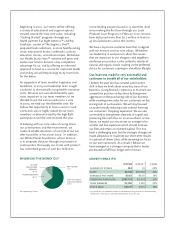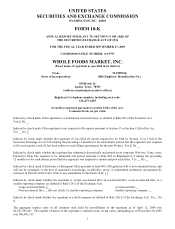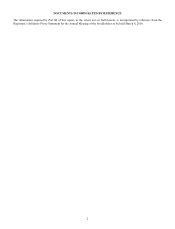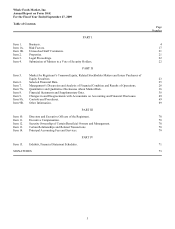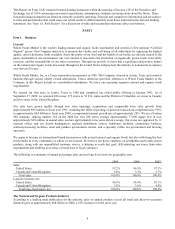Whole Foods 2009 Annual Report Download - page 15
Download and view the complete annual report
Please find page 15 of the 2009 Whole Foods annual report below. You can navigate through the pages in the report by either clicking on the pages listed below, or by using the keyword search tool below to find specific information within the annual report.Stewardship Council (“MSC”). The MSC is a global, independent, non-profit fishery certification organization that rewards
sustainable fishing practices to ensure healthier marine environments and abundant fish stocks for future generations. We are
proud to have been the first U.S. retailer to offer MSC-certified seafood, which displays the MSC label to indicate the
seafood is sourced from responsible, well-managed fisheries. In addition to continually expanding the varieties of MSC-
certified seafood we offer in our stores, we also stopped selling several seafood species that are considered by a consensus of
seafood experts to be depleted in the oceans.
For farmed seafood, our quality standards always prohibited the use of antibiotics, added growth hormones, preservatives
and genetic modification or cloning. In fiscal year 2008, we launched a comprehensive set of enhanced farmed seafood
standards. Now, all of our farmed finfish and shrimp suppliers have passed third-party audits to ensure they meet our
stringent quality standards, which were extended to include:
• farm-to-fork traceability from the hatcheries to the ponds, pens, raceways or tanks where the seafood is raised and
to the plants where it is processed;
• requirements that producers minimize the impact of fish farming on the environment by protecting sensitive habitats
such as mangrove forests and wetlands, monitoring water quality to prevent pollution, and sourcing feed ingredients
responsibly;
• the prohibition of toxic chemicals such as malachite green and organophosphate; and
• requirements that producers provide detailed information on their farming practices and pass independent third-
party audits.
Animal Welfare Standards
In fiscal year 2009, Whole Foods Market was ranked the “most humane grocery store” in a survey conducted by the World
Society for the Protection of Animals, scoring highest among the top 25 largest supermarkets in the United States for the
number of humanely labeled food products on its shelves.
We are dedicated to promoting animal welfare on farms and ranches that raise animals for meat production. Our minimum
standards, which apply to all meat and poultry we sell in our stores, ensure the animals are:
• raised without antibiotics;
• raised without added growth hormones in any species, far beyond the federal regulations that prohibit added growth
hormones in poultry, pigs, veal or bison;
• never fed animal byproducts;
• range or pasture-raised for at least two-thirds of their lives (for ruminants); and
• never tethered or kept in crates (for pigs or veal calves).
Whole Foods Market is strongly committed to helping create alternatives to the “factory farm” methods of raising livestock.
We have encouraged innovative animal production practices to improve the quality and safety of the meat and poultry sold in
our stores, while also supporting humane living conditions for the animals. For this reason, we refuse to sell commercial veal
from tethered calves, foie gras from force-fed ducks, and eggs from caged hens.
In December 2003, we started working through a consultative multi-stakeholder process to develop “Animal Compassionate”
standards, farm animal treatment standards that go above and beyond our baseline requirements for the meat and poultry sold
in our stores, focused on providing environments and conditions for each species that support the animal’s natural physical,
emotional and behavioral well-being. In 2006, that work was then used as a basis for creating meat and poultry production
standards categorized according to a framework for continuous improvement of animal welfare on farms and ranches and to
provide our customers with a clear and transparent way to make informed buying decisions based solely on animal welfare
considerations. In June 2007, we piloted a five-tiered meat and poultry labeling program at our Kensington store in London
based on this framework. Further standards development and implementation of the 5-Step Animal Welfare Rating system
was transitioned to the Global Animal Partnership foundation when it was founded in the spring of 2008. In early 2009,
Whole Foods Market began implementing a pilot project for the Global Animal Partnership foundation to test the
implementation of the 5-Step Animal Welfare Rating system, beginning with our stores in the South Region, before the
foundation extends the program to other retailers.
Locally Grown
Our history and reputation are intimately linked to our support of local farmers. For more than 29 years, we have provided
our customers with the broadest possible selection of the highest quality produce available. Our search for produce begins
right outside our front door in every community where we do business. We are committed to buying from local producers
whose products meet our high quality standards, particularly those who are dedicated to environmentally friendly,
9


